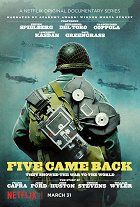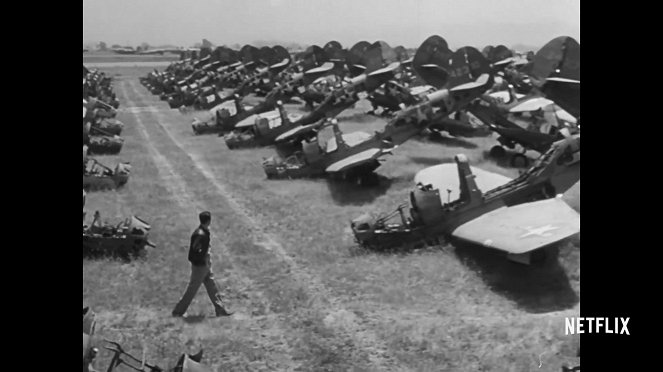Directed by:
Laurent BouzereauScreenplay:
Mark HarrisCinematography:
Sean KirbyComposer:
Jeremy TurnerCast:
Francis Ford Coppola, Guillermo del Toro, Paul Greengrass, Lawrence Kasdan, Steven Spielberg, Meryl Streep (narrator), William Wyler (a.f.) (more)VOD (1)
Episodes(3)
-
The Mission Begins (E01)
-
Combat Zones (E02)
-
The Price of Victory (E03)
Videos (1)
Reviews (2)
Without the participation of personalities such as Spielberg, del Toro and Streep (who reads the commentary), this look at the Second World War through the eyes of five famous Hollywood directors would easily fit in with the dozens of other war documentaries for military enthusiasts that some television channels put on their broadcast schedules with iron regularity. Bouzereau chose the most ordinary form of exposition – talking heads, archival footage, excerpts from scripted films, more talking heads, animated maps, and so on. Therefore, the content rather than the form is worthy of attention. Paradoxically, the series would have benefited if the filmmakers had adhered to a more factually dense book with greater regard for context as the source material and not tried to give the project greater prestige by attaching famous names to it (the directors involved in the documentary are connected with the directors being discussed only because they feel respect for them, not because, for example, they knew them personally – therefore, I would rather understand, for example, the presence of Peter Bogdanovich, who interviewed Ford). Though the gentlemen speak nicely about their filmmaking role models, they don’t say much of value in the end and their words of almost uncritical admiration only needlessly take up space that could have been given to something more revealing. Unsurprisingly, their colleagues who experienced the war at first hand get much more to the point in the earlier interviews. A fascinating aspect is, for example, the account of the formulation of the Why We Fight concept by Frank Capra himself, whose frustration stemming from the pinnacle of German propaganda (Triumph of the Will) led him to the idea of using that same sort of propaganda, but with a different intention. Unfortunately, Five Came Back wants to tell not only the story of how documentaries with artistic ambitions were made during the war (and subsequently used by the government for propaganda purposes), but also about the war itself, so it offers a very simple retelling of the history learned in school. The same “kitchen sink” approach characterises the whole series, which tries to cover a large number of topics, thus leaving no time to discuss at least some of them in greater depth. The view of film propaganda presented here is driven mainly by the effort to interest viewers and spur their admiration for the heroism of Capra, Ford, Huston, Stevens and Wyler, rather than to prompt them to ask more complicated questions (basically, we are led to the idea that German propaganda was bad and American propaganda, often working with similar racial and national stereotypes, was good). Though, thanks mainly to the unique footage from battlefields, Five Came Back is not a failure, it is certainly a missed opportunity. 75%
()
Three hours of informationally exhaustive retrospective in which one famous group of five comments on one unique filmmaking period of another famous group of five. From propaganda to the sentiment that after the war, some people were allowed in Hollywood and others were not. I was devouring every word and at the same time writing out a list of what I needed to see immediately. The most enjoyable part was that Netflix put the most essential movies right at the back.
()
Gallery (65)
Photo © Netflix



Ads